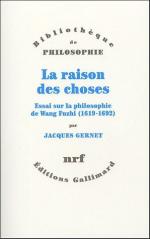|
This section contains 1,074 words (approx. 4 pages at 300 words per page) |

|
WANG FUZHI (zi, Erhnung; hao, Chuanshan; 1619–1692), a Neo-Confucian philosopher. Now recognized along with Huang Zongxi and Gu Yanwu as one of the major thinkers to emerge in seventeenth-century China, Wang was almost unknown in his own lifetime outside of a small circle of followers in his native Hunan. He devoted his life to the task of revitalizing and restoring the cultural heritage and political autonomy of a Confucian China whose decline and fall, culminating in the overthrow of the Ming dynasty and the Manchu conquest, left him a virtual refugee in his own country. He was only thirty-one when in 1650 his patriotic foray into the political arena of the court of the Ming pretender Yungli ended in temporary imprisonment as a result of factional strife. Thereafter he had to content himself with propounding his ideas in a prodigious number of works, none of which was published...
|
This section contains 1,074 words (approx. 4 pages at 300 words per page) |

|


